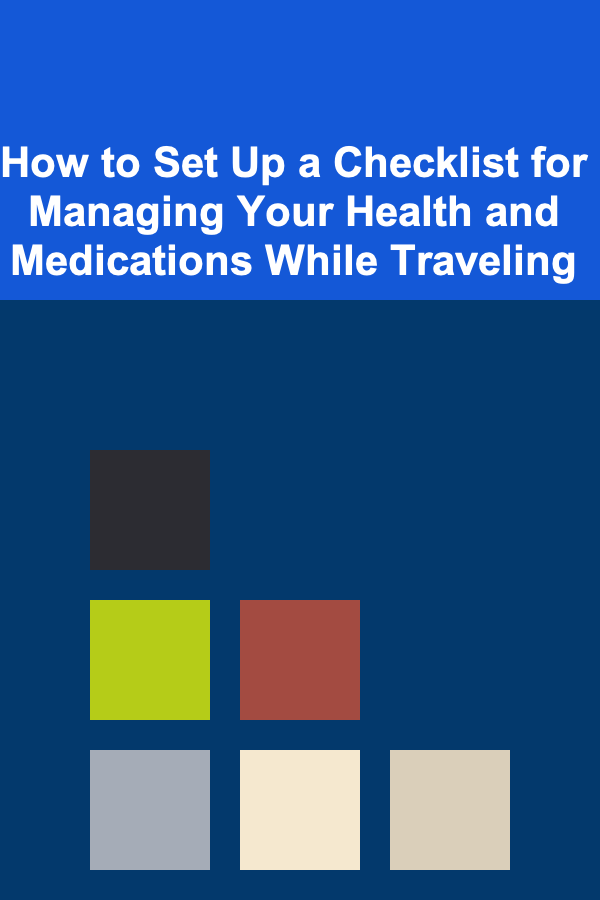
How to Set Up a Checklist for Managing Your Health and Medications While Traveling
ebook include PDF & Audio bundle (Micro Guide)
$12.99$5.99
Limited Time Offer! Order within the next:

Traveling can be an exciting and enriching experience, but it also requires a level of preparation, especially when it comes to managing your health and medications. Whether you're traveling for business, pleasure, or any other reason, staying on top of your health while abroad is essential to ensuring that you have a safe and enjoyable journey. By creating a thorough checklist, you can manage your health needs effectively and avoid any potential setbacks.
In this guide, we'll go over the key steps involved in setting up a health and medication checklist for travel, covering everything from medication organization to health insurance, and providing actionable tips to ensure you stay healthy and prepared.
Gather Essential Health Information
The first step in preparing for travel is ensuring that you have all the necessary health information at your fingertips. This is especially important if you have existing medical conditions, are on long-term medication, or require specialized care.
Key Actions:
- Create a Health Profile: Make a document that outlines your health history, allergies, any ongoing conditions (such as diabetes or hypertension), and emergency contacts. This profile will be helpful if you need medical attention while traveling.
- List Your Medications: Write down a comprehensive list of all your medications, including the dosage, frequency, and purpose of each. Don't forget over-the-counter medicines, supplements, and vitamins.
- Identify Generic Names: If you take prescription medications, it's important to know the generic names, as some brand names may not be available in other countries.
- Emergency Contacts: Have the contact details of your primary care physician, specialists, or any healthcare providers who are familiar with your medical history.
- Travel Health Documents: If necessary, obtain medical certificates for any specific health needs (e.g., a letter from your doctor for medications that are controlled or require injections).
Prepare and Organize Your Medications
When traveling, it's crucial to ensure that your medications are packed properly to avoid disruptions. The right preparation can make it easier to access and manage your medications while on the road.
Key Actions:
- Medication Quantity: Pack enough medication to cover your entire trip, plus a few extra days' worth in case of delays. It's always better to have more than you need, especially if your trip extends longer than planned.
- Packaging and Labeling: Make sure your medications are in their original, labeled packaging. This is particularly important for prescription medications, as it helps with identification and customs clearance.
- Create a Pill Organizer: Consider using a pill organizer to compartmentalize your medications by day and time. This can be especially useful if you're on multiple medications or have a complicated regimen.
- Separate Medications for Easy Access: Keep essential medications (e.g., for chronic conditions or emergency use) in your carry-on bag. This ensures that you can access them easily during the flight or in case your checked luggage is delayed.
- Medications for Common Travel Illnesses: In addition to your regular medications, pack a small supply of over-the-counter drugs for common travel-related health issues, such as motion sickness, allergies, pain relief, or digestive problems.
- Medical Equipment and Supplies: If you use medical devices or need specific equipment (e.g., inhalers, insulin pens, glucose meters), be sure to pack these and check if they are allowed on flights.
Know the Regulations of Your Destination Country
Different countries have varying rules and regulations regarding the importation of medications. Before traveling, familiarize yourself with any specific requirements related to the medications you take.
Key Actions:
- Check Customs Regulations: Some countries have strict controls on medications, especially narcotics, psychotropics, or certain prescription drugs. Research the customs regulations of your destination country to ensure you can bring your medication without issues.
- Prescription Laws and Documentation: In some countries, you may need to present a doctor's note or prescription to bring certain medications with you. If your medications are controlled or prescription-only, make sure you have documentation to prove they are medically necessary.
- Traveling with Controlled Substances: If you need to travel with a controlled substance (e.g., opioid pain relievers, sedatives), be sure to check both the departure and arrival country's rules. Some countries may allow you to carry these drugs with a valid prescription, but others may have stricter regulations.
- Emergency Medical Services in Foreign Countries: Make a note of the emergency medical contact numbers (e.g., 911 in the U.S. or 112 in Europe) for your destination. This is especially important in case you need to seek urgent care while abroad.
Ensure You Have Travel Health Insurance
Medical emergencies can happen at any time, especially while traveling. Having travel health insurance that covers you abroad ensures you're prepared if something goes wrong. This can cover everything from routine doctor visits to hospital stays or evacuation in case of severe illness or injury.
Key Actions:
- Review Your Current Health Insurance: Some health insurance plans offer international coverage. Review your policy to see if you're covered while traveling abroad, and if so, under what conditions.
- Purchase Travel Insurance: If your current health insurance does not offer sufficient coverage while traveling, consider purchasing travel insurance. Look for a policy that covers medical emergencies, trip interruption, and evacuation, especially if you're traveling to a remote area.
- Include Pre-Existing Conditions: If you have a pre-existing condition, make sure your travel insurance policy specifically covers it. Some insurers may exclude coverage for conditions that existed before the trip, so it's important to verify this in advance.
- Know How to Access Health Care: Familiarize yourself with how to access medical care in the country you're visiting. Some travel insurance policies provide 24/7 emergency hotlines where you can get assistance in finding local doctors or hospitals.
Vaccinations and Health Precautions
Certain destinations may require you to get vaccinations or take other health precautions before traveling. Some countries require proof of immunization for diseases such as yellow fever or malaria.
Key Actions:
- Check Vaccination Requirements: Research any vaccination requirements or recommendations for your destination country. The CDC (Centers for Disease Control and Prevention) and WHO (World Health Organization) offer guidelines on required and recommended vaccinations for travelers.
- Get Vaccinated Early: If you need vaccinations, schedule them well in advance. Some vaccines require multiple doses or take time to become effective, so don't leave this to the last minute.
- Travel Health Kit: Put together a health kit that includes not just your medications but also items like hand sanitizers, antiseptic wipes, a thermometer, insect repellent (if necessary), and any specific preventive medications (e.g., malaria prophylaxis).
- Health Alerts and Travel Advisories: Check for any health advisories or alerts for your destination. For example, certain regions may be experiencing outbreaks of diseases such as Zika, dengue, or cholera.
Monitor Your Health While Traveling
Once you're on your trip, it's important to continue monitoring your health and medications. Staying proactive can help prevent health issues from arising while you're far from home.
Key Actions:
- Stay Hydrated and Rested: Travel, especially long flights, can be draining. Ensure that you stay hydrated and get adequate rest to avoid fatigue and travel-related illness.
- Watch for Travel Illnesses: Travelers are often exposed to different climates, food, and water. Pay attention to food and water safety, avoid drinking tap water unless it's properly purified, and wash your hands frequently.
- Follow Your Medication Schedule: Stay on track with your medication regimen. Set reminders on your phone or use a medication management app to help ensure you take your medications as prescribed.
- Be Aware of Local Health Risks: Be mindful of potential health risks at your destination, such as air quality, water contamination, or tropical diseases, and take appropriate precautions.
Have a Contingency Plan
Even the best-laid plans can go awry. If you lose your medications or face an unexpected health issue while traveling, it's important to have a backup plan.
Key Actions:
- Know Where to Get Medication Locally: Research local pharmacies or medical facilities where you can obtain your medications if necessary. If you're traveling with essential or prescription medications, make sure you have access to a reliable source.
- Keep a Backup Supply of Medications: If you lose or run out of your medication, having a backup supply can be a lifesaver. Keep extra medication in a separate bag or location, and ensure it's within easy reach.
- Know How to Access Emergency Care: If you require emergency medical care, know where the nearest hospital or clinic is located and how to get there.
Conclusion
Managing your health and medications while traveling requires careful planning, but it doesn't have to be stressful. By setting up a thorough checklist and taking proactive steps, you can ensure that your health needs are met while enjoying your travels. From organizing your medications to understanding local regulations and obtaining travel insurance, each action is a crucial part of ensuring a smooth and healthy trip.
Remember, preparation is key. When you're ready for anything, your travels can be worry-free and filled with the joy of new experiences.
Reading More From Our Other Websites
- [Personal Care Tips 101] How to Choose a Razor with the Right Grip for Better Control
- [Home Renovating 101] How to Renovate Your Home to Create a Relaxing Atmosphere
- [Personal Investment 101] How to Build a Sustainable and Ethical Investment Portfolio
- [Home Soundproofing 101] How to Evaluate the Effectiveness of Your Soundproofing Efforts
- [Personal Care Tips 101] Incorporating Ayurvedic Self-Care Rituals into Your Daily Life
- [Reading Habit Tip 101] Tech-Boosted Reading: Apps and Tools That Skyrocket Your Productivity
- [Home Maintenance 101] How to Maintain Your Home's Lawn and Landscaping Year-Round
- [Home Rental Property 101] How to Create an Attractive Rental Property Ad that Stands Out
- [Home Security 101] How to Install a Home Safe for Maximum Protection of Valuables
- [Personal Investment 101] Making Money with Deep Learning: From Idea to Income

How to Organize a Family Volunteer Day for Community Engagement
Read More
How to Protect Your Dropshipping Brand and Prevent Unauthorized Resellers
Read More
How to Sell Digital Products Successfully for Instructional Designers
Read More
Unlocking Success as a Teacher: A Comprehensive Guide to Teaching Excellence
Read More
How To Build Walking Robots from Scratch
Read More
How to Create a Social Media Content Calendar for Rescue Animals
Read MoreOther Products

How to Organize a Family Volunteer Day for Community Engagement
Read More
How to Protect Your Dropshipping Brand and Prevent Unauthorized Resellers
Read More
How to Sell Digital Products Successfully for Instructional Designers
Read More
Unlocking Success as a Teacher: A Comprehensive Guide to Teaching Excellence
Read More
How To Build Walking Robots from Scratch
Read More